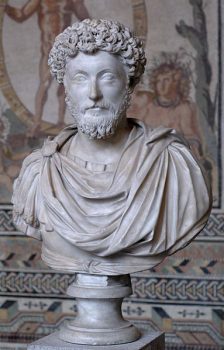Amor Fati: Stoicism in Rome Posted by Brittany Britanniae on Nov 16, 2016 in Roman culture
Salvete Omnes! I hope we are all doing well this week! This week, let us take a look at the ancient philosophy of the Stoics. Although Stoicism is generally a Hellenistic philosophy, Ancient Rome picked up the teachings and ways of thinking towards the end of its popularity and have helped preserve the teachings

Bust of Zeno (of Citium ?). Found in 1823 near the Jardin des Plantes and the ampitheatre. Esperandieu, 1768. Courtesy of Wikimedia Commons.
The philosophy of the Stoics, Stoicism, got its name from the place where it was originally taught. This was the Stoa Poikile, the “painted porch”. The Greek word Stoa, for stone, was taken for the name and has served very well to denote the reserved and steadfast nature of the philosophy.
Stoicism is a philosophy centered around the belief that a person, through virtue and self-control, can navigate the world with a clear mind. They recognize ethics as the main focus of human knowledge, and combined logic, monistic physics, and naturalistic ethics in their worldview. The original form of Stoicism recommended “apatheia,” a numbness to the world. This was replaced in later years by the use of self-control to face the brunt of the world, but also the prioritization of the appreciation of the world.
Stoicism was developed from the ideas of the Cynics. Zeno of Citium taught the beginnings of Stoicism at the Stoa Poikile in public, which was a rare and peculiar practice. From Zeno the teachings were carried on by Cleanthes, Chrysippus, Diogenes of Babylon, all the way to the practitioners of the Late Stoa: Seneca, Epictetus, and finally Marcus Aurelius.

Bust of Marcus Aurelius (reign 161–180 CE). Courtesy of Wikimedia Commons.
No works from the original teachers of Stoicism survives, the only surviving works belong to the thinkers of the Late Stoa.
Marcus Aurelius’ work, Meditations, was not intended for publication. The Meditations include the emperor’s personal musings concerning life, death, reason, logic, ethics, and emotion. His writings reflect his conviction to Stoic beliefs that the quality of a person’s life is governed by their thoughts and not by the influences of the world around them.
Stoicism also promotes the understanding that each person serves different roles in life, but that life has a natural and determined flow that a person must accept and can only truly be at peace if they can learn gratitude and control themselves from being bitter at missing out on other roles or possibilities in life. This served the cosmopolitan, multicultural nature of the vast Roman Empire. Romans also appreciated the universal moral code promoted by Stoicism and the teachings concerned with dealing with pain and fear in the face of events in the world. The phrase “Amor Fati”, “love of fate”, is connected to this philosophy. This is generally the belief that one’s true free will is exercised when one decides to love their fate and accept everything that happens, even suffering, as at least necessary if not good.

Court of Emperor Justinian with (right) archbishop Maximian and (left) court officials and Praetorian Guards; Basilica of San Vitale in Ravenna, Italy. Courtesy of Wikimedia Commons.
Stoicism was considered the most popular philosophy for the elites of the Hellenisitic world and for some time in the Roman Empire. This popularity did not last. The last true Stoic was the Roman emperor Marcus Aurelius. Stoicism would be banned, along with the teachings of all other pagan philosophy schools in AD 529 by Emperor Justinian I. This was because the pagan philosophies appeared to be at odds with the Christian faith.
Today, Stoicism lives on and has evolved from the writings that the Roman Stoics left behind. The philosophers of Rome changed Stoicism and it is still evolving.

Build vocabulary, practice pronunciation, and more with Transparent Language Online. Available anytime, anywhere, on any device.
About the Author: Brittany Britanniae
Hello There! Please feel free to ask me anything about Latin Grammar, Syntax, or the Ancient World.



